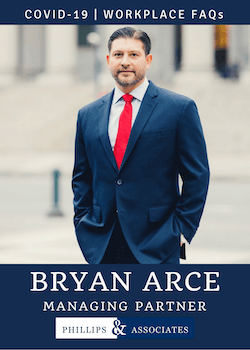New York City Lawyers Experienced in Workplace Disputes

The coronavirus pandemic has had a substantial impact on jobs. The virus is most likely to spread when an infectious person is in close contact, within about six feet of another person. Asymptomatic people can also spread the virus. Businesses in New York are required to follow certain safety and health precautions to avoid coronavirus spread. Additionally, employers may need to provide accommodations for workers with disabilities so that they are able to perform their jobs during the pandemic without being exposed to a risk of severe illness. Employers should engage in careful calculations regarding requirements that employees get the COVID-19 vaccine. If you are wondering whether your employer can fire you for not getting the COVID-19 vaccine, you may wish to discuss the situation with the experienced New York City wrongful termination lawyers at Phillips & Associates.
Can My Employer Fire Me for Not Getting the COVID-19 Vaccine?
COVID-19 vaccinations are now available to many people. However, this does not mean that everyone wants to get vaccinated, some people cannot get vaccinated yet, and some people cannot get vaccinated at all, either for health or religious reasons. Your employer may institute rules for the health and safety of its workforce; this could include a requirement that workers get vaccinated.
The Equal Employment Opportunity Commission (EEOC) enforces federal workplace anti-discrimination laws, such as the Americans with Disabilities Act (ADA). Your employer can ask you for proof of receipt of a COVID-19 vaccination. This request is not a disability-related inquiry under the ADA. If your employer inquires further, such as asking you why you did not get a vaccination, the ADA standard may be implicated.
Additionally, prescreening vaccination questions may implicate the ADA's rules regarding disability inquiries or questions likely to obtain information about a disability. The CDC tells health care providers to ask certain questions prior to administering the vaccine so that they can make sure that there are not medical reasons that would stop patients from receiving the vaccination. If your employer requires you to receive a vaccination from the company, or a third party, the prescreening medical questions are subject to the ADA standards for disability-related inquiries. To show that their questions are job-related and consistent with business needs, an employer must have a reasonable belief based on objective evidence that an employee who does not answer questions and does not receive a vaccination will present a threat to the health or safety of the employee or others.
There are situations in which disability-related screening questions do not need to meet the usual ADA standard. When an employer offers a vaccination to you on a voluntary basis, the ADA mandates that your decision to answer the prescreening questions must also be voluntary.
Disabilities
Some employees may not be able to receive a COVID-19 vaccination because of a disability. The ADA permits an employer to impose a qualification standard that requires a worker to not present a direct threat to the safety or health of other people in the workplace. A vaccination requirement would be a safety-based qualification standard. If the vaccination requirement tends to screen you out because you have a disability, the employer needs to show that you would present a direct threat due to a significant risk of substantial harm to the safety or health of others.
Employers are supposed to individually assess four factors to decide whether there is a direct threat: how long the risk lasts; the severity and nature of the possible harm; the chance that a potential harm will occur; and how immediate the threat is. If your employer determines that you present a direct threat at the worksite, and you cannot be vaccinated because of a disability, the employer cannot exclude you from the workplace unless there is no way to provide a reasonable accommodation that would mitigate the risk so that you do not present an immediate threat. As with other reasonable accommodations, the employer does not need to provide the accommodation if it would present an undue hardship to the company.
If there is a direct threat that cannot be mitigated, the employer may be able to exclude you from coming into the workplace, but that does not mean that it can automatically fire you. There may be other federal, state, or local laws that apply to the situation. You could be eligible to work remotely or eligible for a leave. Your employer should engage with you in a good-faith interactive process to determine whether there is a workplace accommodation that does not create an undue hardship.
Contact Our Experienced New York City Attorneys
If you believe that you were terminated for not getting the COVID-19 vaccine, you should discuss your situation with the trial attorneys at Phillips & Associates. We represent workers in Brooklyn, Manhattan, Queens, Staten Island, the Bronx, and Nassau, Suffolk, and Westchester Counties, as well as New Jersey, Pennsylvania, and Florida. Call us at (866) 229-9441 or complete our online form.
